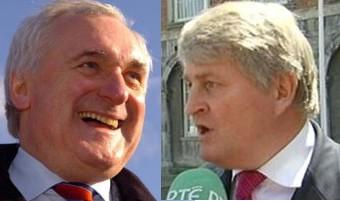Maid of Erin weeps at what Ireland has become

Around the corner from Dublin Castle, on Castle Street, are the delightful offices of Dublin Civic Trust.
In those offices are the decorations and artefacts rescued from one of the old delights of Dublin - the Irish House, a pub that used to stand at the corner of Winetavern Street and Wood Quay, and which was shamefully demolished by Dublin Corporation in 1968.
The Irish House was built in 1870, and was a splendid example of Irish romanticism at the time of the Celtic Revival. It had a representation at the front of the building of Henry Grattan addressing the Patriots’ Parliament. There was also a statue of Daniel O’Connell and one of the weeping Maid of Erin, with her stringless harp beside her, chained in bondage, representative of the state of Ireland.
I visited the weeping Maid of Erin in the Dublin Civic Trust gallery last Friday afternoon and - unwisely, as it transpired - told her of the closing proceedings right behind the gallery, in Dublin Castle, that morning.
There in George’s Hall, at perhaps the final public sitting of the Moriarty Tribunal, there was examination of evidence that businessman Denis O’Brien - when applying for the mobile phone licence in 1995 - gave a false account of the financial backing then available to his consortium. In the witness box was a former senior executive of an American financial house, Advent International plc.
At the time of the application for the mobile licence, O’Brien said Advent was one of the backers of the venture. Correspondence obtained by the tribunal seemed to contradict that claim, but the former Advent executive claimed emphatically that Advent was indeed a backer at the time. He seemed unable to explain how it was that a lawyer acting for Advent at the time appeared quite emphatic that Advent had made no commitment to back the project.
It is for the tribunal to evaluate the competing evidence but, if the final report contains anything like the provisional findings, as leaked in the last few months, the report will be even more startling than any of the evidence of corruption that has so far emerged.
Civil servants fear they will be accused of having subverted the process for awarding the licence, to have doctored documents, to have lied and covered up. The Maid of Erin was terribly upset.
I did not remind her that the report into clerical child abuse in the Dublin diocese was to be published this week. The report - again, according to leaked versions - will indict a succession of former Archbishops of Dublin, along with clerics and others.
Probably coinciding with the publication of the Moriarty Report will be the final report of the Mahon Tribunal. That may find that a former Taoiseach gave explanations for his wealth which were not at all believable, even though there is no evidence that he intervened in the planning process to do with Liffey Valley.
The Maid of Erin is already in deep distress over the banks, the economy, our politics, the whole political system and, most of all, an obsequious deference to wealth and corporate power.
She does not believe that the government - or, rather, Brian Cowen and Brian Lenihan (we don’t bother with constitutional niceties any longer) - had no option but to give the blanket guarantee to the banks on September 30 last year, a guarantee unequalled in its scope anywhere else.
After all, didn’t Michael Somers, head of the National Treasury Management Agency (NTMA), know that the bank which propelled the two Brians into the guarantee had been a basket case for years?
He told the Committee of Public Accounts last May:
‘‘We have always had certain reservations about Anglo Irish Bank, because it was a kind of mono-line activity that lent to one sector . . . It always seemed to me that Anglo Irish Bank paid too much on deposits and charged too much when lending money out. That model maybe fine when seas are calm but, as it hits choppy waters, it runs into trouble . . .
‘‘We had counterparty credit limits for approximately 100 banks where we placed all our spare cash. We would have had limits of up to €200 to €300 million on so-called good banks. I am not breaching any confidence by saying now that we were always hesitant about Anglo Irish Bank. We came under great pressure to create a limit for Anglo and to place money with it.
The largest limit we went to for Anglo Irish Bank was €40 million. That was as high as we were prepared to go." What the Maid of Erin wants to know is how, if Somers ‘‘always’’ knew that Anglo Irish Bank was a basket case, nobody else seemed to have noticed. Did Somers not mention this to anybody in the Central Bank or Department of Finance?
Did he not have a word with any Minister for Finance - Charlie McCreevy, Brian Cowen or Brian Lenihan - about his apprehensions? Did nobody in the Department of Finance know that the NTMA wasn’t depositing much money with Anglo, and wonder why?
If they had known some time before September 2008 that Anglo had gone zombie, they could have planned either to rescue it or set up an alternative banking structure - and then rescue nobody when the crisis broke.
The Maid is distressed, too, that the children of Ireland are to be targeted in the coming budget, that the Parliament for which she longed has become a circus. Then, there is all that deference.
The deference to the powerful in the banks, the deference to the wealthy, the deference to the elite professions.
It is not for this that she has wept for 140 years.
